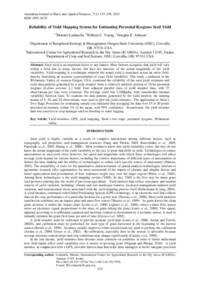Reliability of Yield Mapping System for Estimating Perennial Ryegrass Seed Yield

Authors:
Seed yield is an important factor to any farmer. Most farmers recognize that yield will vary within a field due to many factors, but they are unaware of the actual magnitude of the yield variability. Yield mapping is a technique whereby the actual yield is measured across an entire field, thereby furnishing an accurate representation of exact field variability. This study, conducted in the Willamette Valley of western Oregon, USA, examined the reliability of the seed yield estimates and yield data patterns generated by a yield monitor from a relatively uniform portion of 76-ha perennial ryegrass (Lolium perenne L.) field. Four adjacent parallel lines of yield monitor data, with 27 observations per line, were extracted. The average yield was 2,100kg/ha, with considerable internal variability between lines. To examine the data patterns generated by the yield monitor, the running means of 5, 10, and 20 observations were used to plot the yield estimates. The application of Stein’s Two-Stage Procedure for estimating sample size indicated that averaging the data over 15 to 20 points provided an estimate within 5% of the mean, with 95% confidence. In particular, the yield monitor data was sensitive to crop damages such as flooding or water logging.
